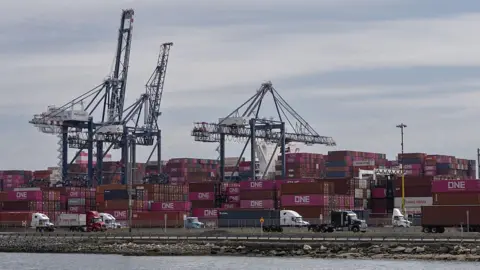In a significant shift in U.S. trade policy, President Donald Trump has signed an executive order that marks the end of a global tariff exemption on low-cost goods, impacting millions of American consumers. This directive, which is set to take effect on August 29, broadens the scope of previous regulations that primarily targeted low-priced imports from China and Hong Kong, now extending these tariffs to include products from around the world.
The executive order eliminates what is known as the de minimis exemption, which previously allowed goods valued at $800 or less to enter the United States without any tariffs. This exemption had become a popular avenue for American shoppers seeking affordable items, including clothes and household goods from online platforms like Shein and Temu. With the removal of this exemption, consumers can expect an adjustment in pricing, as packages will now incur the same tariff rates applied to traditional goods based on their country of origin.
The U.S. White House has cited concerns regarding the misuse of the de minimis exemption, claiming it has been exploited for illicit activities, particularly the trafficking of dangerous synthetic opioids into the country. This assertion underscores the administration’s focus on combating drug-related issues and maintaining national security. Previously, the exemption allowed agility for various shipments to evade thorough customs checks, raising alarms regarding the potential for increased smuggling and duty evasion. The administration has stressed that they believe such measures were necessary to enhance safety and protect American lives.
This change in regulations follows prior actions taken by the Trump administration, which had already excluded Chinese goods from the de minimis exemption on May 2nd. However, Canada and Mexico, which also represented significant sources of low-cost goods entering the US, had previously escaped similar duties. The anticipated changes are significant enough that they warrant a reevaluation of how consumers engage with international goods, particularly with e-commerce rising in prominence.
Interestingly, while Congress had considered the elimination of the de minimis exemption for all countries in a legislative bill known as the One Big Beautiful bill, its implementation was delayed until July 2027. However, using emergency presidential powers, Trump has fast-tracked this measure to take effect just a month from now. The White House has justified this acceleration by invoking the need to address national emergencies more promptly, suggesting that the protection of American businesses and lives depended on the swift execution of these new policies.
Notably, while the new tariff rules will affect most shipments, they carry exceptions for personal items brought back into the country by travelers valued at $200 or less, as well as gifts that do not exceed $100. These provisions aim to minimize the impact on American citizens who may frequently travel abroad.
As this new policy rolls out, it’s expected that it will cause a ripple effect across e-commerce and retail. Online shoppers may find themselves reassessing their buying habits, especially as they now face added costs for many of the low-priced products they have grown accustomed to purchasing tax-free from overseas. Retailers and consumers alike are bracing for changes in prices and availability, particularly as companies representing low-cost goods will be re-evaluating their market strategies in light of these newly imposed tariffs. The broad nature of this regulation signifies not only an economic shift but potentially a change in the landscape of international commerce as consumer expectations and shipping practices adapt to the evolving political and economic climate.












